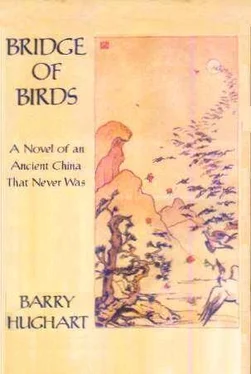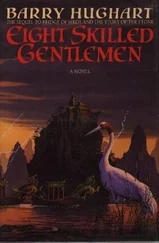“Wine!” he wheezed.
I searched for an unbroken jar, but there wasn't one. “Venerable Sir, I fear that all the wine is gone,” I said politely.
His eyes creaked toward a shabby purse that lay in a puddle. “Money!” he wheezed.
I picked up the purse and opened it. “Venerable Sir, I fear that the money is gone too,” I said.
His eyeballs rolled up toward the top of his head, and I decided to change the subject.
“Have I the honor of addressing the great Li Kao, foremost among the scholars of China? I have a problem to place before such a man, but all that I can afford to pay is five thousand copper cash,” I said sadly.
A hand like a claw slid from the sleeve of his robe. “Give!” he wheezed.
I placed the string of coins in his hand, and his fingers closed around it, taking possession. Then the fingers opened.
“Take this five thousand copper cash,” he said, enunciating with a painful effort, “and return as soon as possible with all the wine that you can buy.”
“At once, Venerable Sir,” I sighed.
Having performed similar chores for Uncle Nung more times than I cared to count I judged it wiser to buy some food as well, and when I returned I had two small jars of wine, two small bowls of congee, and a valuable lesson in the buying power of copper coins. I propped the old man's head up and poured wine down his throat until he had revived enough to grab the jar and finish the rest of it at a gulp, and long practice enabled me to slip a bowl of congee into his fingers and get it to his lips before he realized that it wasn't wine. Two spots of color had appeared in his cheeks when he finished it, and after the second jar of wine he willingly attacked the second bowl of congee.
“Who you?” he said between slurps.
“My surname is Lu and my personal name is Yu, but I am not to be confused with the eminent author of The Classic of Tea. Everyone calls me Number Ten Ox,” I said.
“My surname is Li and my personal name is Kao, and there is a slight flaw in my character,” he said matter-of-factly. “You got a problem?”
I told him the whole story, and I was weeping at the end. He listened with interest, and had me go over it again, and then he pitched the empty bowl over his shoulder so that it smashed upon the rest of the crockery. When he hopped up from his mattress I was astonished to see that he was as spry as a goat.
“Number Ten Ox, eh? Muscles are highly overrated, but yours may come in handy,” he said. “We will have to hurry, and for a variety of reasons you may be required to twist somebody's head off.”
I could scarcely believe my ears.
“Master Li, do you mean that you will come to my village and find out how a plague can learn to count?” I cried.
“I already know how your plague learned to count,” he said calmly. “Bend over.”
I was so stunned that I bent over backward until he advised me to try it the other way around. Master Li hopped nimbly upon my back and wrapped his arms around my neck and stuck his tiny feet into the pockets of my tunic. He was as light as a feather.
“Number Ten Ox, I am no longer as fast on my feet as I used to be, and I suspect that time may be crucial. I would suggest that you take aim at your village and start running like hell,” said the ancient sage.
My head was spinning, but my heart was wild with hope. I took off like a deer. Li Kao ducked as I bolted through the door and my head struck something, and when I skidded from the alley and glanced back I saw that my head had struck the bottom of an old shabby sign, and that a half-closed eye was spinning around and around as though it was peering at mysteries in every corner of the empire.
I have no idea whether or not it was premonition, but the image remained with me throughout our journey back to Ku-fu.
Auntie Hua looked somewhat askance at the sage I had brought back to our village, but not for long. That antiquated gentleman stank of wine, and his robe was as filthy as his beard, but such was his air of authority that even the abbot accepted his leadership without question, and Li Kao walked from bed to bed, peeling back the children's eyelids and grunting with satisfaction when he saw that the pupils of their eyes were not fixed and dilated.
“Good!” he grunted. “It is not a question of teaching a plague how to count, which is quite simple, but of which agent was used, and I had feared that there might be brain damage. Now I shall need samples of mulberry leaves from every grove, clearly labeled so that we will know where they came from.”
We raced to do his bidding, Basket after basket of mulberry leaves was carried up the hill to the monastery, and Li Kao placed them in vials and added chemicals, while the abbot adjusted the fires beneath alchemists’ stoves. When the eighteenth batch of leaves turned the chemicals pale orange Li Kao began to work with great speed, boiling the leaves to a pulp, adding more chemicals a drop at a time, increasing the heat and reducing the liquid. The pale-orange color began to turn green. When the liquid had been reduced to nothingness a tiny pile of black crystals remained in the vial, and Li Kao placed half of them into a new vial to which he added some colorless liquid. Then he straightened up and stretched wearily.
“Another minute and I will be sure,” he said, and he walked over to the window. Some of the younger children who had escaped the plague were wandering disconsolately in the abbot's garden, and Li Kao pointed to a small boy. “Watch,” he said.
We watched and nothing happened. Then the boy absent-mindedly plucked a leaf from a tree, and he lifted it to his mouth and began to chew.
“All children do that,” Master Li said quietly. “The children of your village who were old enough to work in basket brigades chewed mulberry leaves, but the older they were, the more self-conscious they became about doing childish things, and that is why the seizures were limited to children between the ages of eight and thirteen. You see, we are not dealing with a plague but with an agent that was deliberately designed to kill silkworms.”
He turned and pointed to the vial. The liquid had the evilest color that I had ever seen: slick and green and slimy and garish, like gangrene.
“That is ku poison, for which there is no known antidote,” he said grimly. “It was smeared upon the leaves in the mulberry grove that belongs to a certain Pawnbroker Fang.”
A lynch mob poured down the hill, but the warehouse door was locked. “Ox!” the abbot snarled. I kicked the door halfway across the room, and a pathetic sight met our eyes. Ma the Grub was lying on his back. Traces of ku poison smeared his lips, and he was as dead as Confucius. Pawnbroker Fang was still alive, but barely. His glazed eyes tried to focus on us, and his lips moved.
“We never intended to… It was the silkworms,” he whispered. “If they died… the IOUs… own everything… Now my daughter…”
He was almost gone. The abbot knelt and placed a small jade Buddha in the pawnbroker's hands and began to pray for his miserable soul. Fang's eyes opened one last time, and he looked blindly down at the jade Buddha, and he made a truly heroic effort.
“Cheap, very cheap,” he sneered. “No more than two hundred…”
Then he too was dead.
Li Kao gazed down at the bodies with a rather strange expression on his face, and then he shrugged his shoulders.
“So be it,” he said. “I suggest that we leave them here to rot and return to the monastery. We have far more important things to worry about.”
Pawnbroker Fang and Ma the Grub had almost certainly killed the children of my village, but when I looked back at the bodies I could find no anger in my heart.
The abbot led the way. We lit candles, and our shadows loomed like twisted giants upon the gray stone walls as we trudged down the long winding flight of steps to the great vaulted cellar where the scrolls were stacked in long rows of wooden shelves. Our monastery is very old, and over the centuries the abbots had added to the library. The medical texts numbered in the hundreds, and I helped the novices bring scroll after scroll to the long tables where the abbot and his bonzes checked every reference to ku poison. The references were extensive, since the poison has been a favorite agent for assassination for nearly two thousand years, and the information was always the same: The victims’ vital signs would drop so low that they expended almost no energy at all and could last for months, but nothing could restore them to consciousness, and death was inevitable. There was no antidote.
Читать дальше











